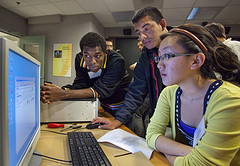Race and Class in Montgomery County
DCentric reader Matt kindly pointed me towards a blog I was unaware of– “Just up the Pike“. It is written by Dan Reed, who apparently moved to Philly in August. The link Matt sent me was to a post called, “why are all the poor kids sitting together in the cafeteria?“. In it, Reed wrote:
The biggest sin of the local blogosphere is that Lydia Sullivan at Snoburbia doesn’t get more attention for her thoughtful and provocative posts on the life of the privileged Montgomery County (Md.) suburbs. Over the weekend, she wrote that class, not race defines who you are…
I headed over to Snoburbia and found a post about Lydia Sullivan’s children and their classmates– and how they interact with each other:
This got me thinking about how race is treated in snoburbia. In the local snoburban high school, kids mix seemingly without regard to race. They think nothing of calling someone of another race, “hot.” (Where and when I grew up, one would have kept such a thought to oneself.) My kids and their cohort have friends of white, African American, Asian, Middle Eastern and Latino family background. They don’t talk about race at all. At all. Really. It just doesn’t come up, except perhaps as a descriptor.
But when I look more closely at who all of these kids are, it becomes clearer. No matter the race, all of the children are advantaged, from educated parents. Some of the blacks and Latinos are children of government bureaucrats, scientists or diplomats. Some were born in another country. But they all have at least some money and educated parents.
Left out of the snoburban teen social groupings are black and Latino kids from the less fortunate neighborhood. (There are virtually no poor white or Asian kids around here.) Those kids also attend the same high school, but they talk and dress differently. They live in one or two pocket neighborhoods and ride the school bus. They don’t go to the same parties or even to the same mall. They are more on MySpace than Facebook, so their online social interactions are limited; this aspect is rapidly changing, however, and may already have changed by the end of this paragraph.
Interesting. Thanks, Matt!





